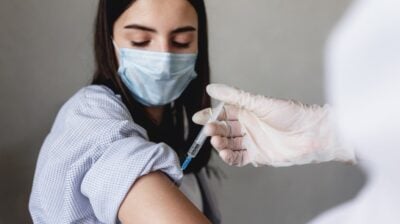What is HPV?
HPV is a group of more than 100 viruses that can cause cancer.

HPV or ‘human papillomavirus’, is a group of more than 100 viruses. HPV is common, and most people will become infected with a form of HPV in their lifetime. HPV infection is most common in people in their late teens and 20s.
HPV is spread by intimate sexual skin-to-skin contact. You can get HPV from sexual contact with another person with the virus. Most HPV infections go away on their own and do not need treatment. However, in some people, the HPV infection can persist and cause cancer. HPV also causes genital warts.
How common is cancer caused by HPV in Ireland?
HPV causes 1 in 20 cancers worldwide.
HPV can cause a range of pre-cancerous lesions (abnormal cells). Almost 10 out of 10 cervical cancers are caused by HPV.
High-risk types of HPV also cause about:
- 5 out of 10 cancers of the vulva
- 6 out of 10 cancers of the mouth and throat (oropharyngeal cancers)
- Almost 7 out of 10 cancers of the vagina
- 9 out of 10 cancers of the anus
- Almost 4 out of 10 cancers of the penis
Each year in Ireland, HPV is estimated to cause 406 cases of cancer.
Each year in Ireland, amongst women and people with a cervix:
- Over 6,500 need hospital treatment for pre-cancer of the cervix
- Almost 300 get cervical cancer
- 90 die from cervical cancer
How do you get HPV?
HPV is spread by intimate sexual skin-to-skin contact. You can get HPV through sexual contact with someone with the virus, such as vaginal, anal or oral sex. HPV can be spread even when a person has no signs or symptoms.
Anyone who is sexually active can get HPV, even if they have had sex with only one person. You can also develop symptoms years after you have sex with someone who has the virus. This makes it hard to know when you first became infected. You may also have no signs or symptoms.
HPV in people with a penis
HPV infection is also a concern for gay, bisexual, and other men who have sex with men. This is also true for people with a penis who have sex with other people with a penis. Some types of HPV can cause genital warts and some can lead to the development of anal and oral cancers.
HPV vaccination is an effective way to reduce your risk of genital warts and your risk of developing HPV-associated cancer in the future.
The HPV vaccine is available for all gay and bisexual men, MSM, and those living with HIV, up to and including 45 years of age through public STI and HIV clinics. It is also free for people with a penis who have sex with other people with a penis. Speak to your GP or a sexual health nurse to see if you are eligible for the HPV vaccine.
Protection from HPV
HPV is spread by intimate sexual skin-to-skin contact. Condoms can reduce the risk of getting HPV, but they don’t offer complete protection. HPV can infect areas not covered by a condom – so condoms will not fully protect you from getting HPV. The HPV vaccine protects against genital warts, cervical cancer and other cancers.
Cervical screening for HPV
If you have a cervix and have the HPV vaccine, you should still have your cervical screening test (smear test) every time it’s due. Even though the HPV vaccine protects against most cervical cancers, it doesn’t protect against all of them
There is no HPV screening currently available for people without a cervix. The HPV vaccine is your best chance at protecting yourself against genital warts and HPV-related cancers.
How can I protect myself against STIs?
There are many great options to help protect your sexual health, but none of them are 100% effective. Even if you use condoms every time you have penetrative sex, you are still at risk of getting genital warts and herpes, as these can be passed through skin-to-skin contact. Going for an STI check or taking a home STI testing kit with a partner before having sex, can be a great way of protecting yourself and those you have sex with against STIs and HIV. However, not all STI checks check for all STIs, so it is important to speak to your healthcare provider and ask them what is being tested for as part of your screening.
Discussing with your sexual partners the type of contraception or protection options available to you, and agreeing on a type that works for everyone involved can help to reduce the risk of pregnancy, STIs and HIV. Looking out for sores or symptoms on a partner’s genitals before having sex with them, can help to identify STIs that they may not be aware of. If you do see any signs that someone may have an STI, do not have sex with them until you know for certain it is safe to do so. Asking someone about their sexual health history is the responsible thing to do before having sex, and it should not be taken as an insult if someone asks you about yours.
Need more information, advice or guidance?
We offer information, advice and guidance about the issues that matter to you. Our online Youth Information Chat service is for 16 to 25 year olds and is available Monday to Friday, 4pm to 8pm (excluding Bank Holidays).






